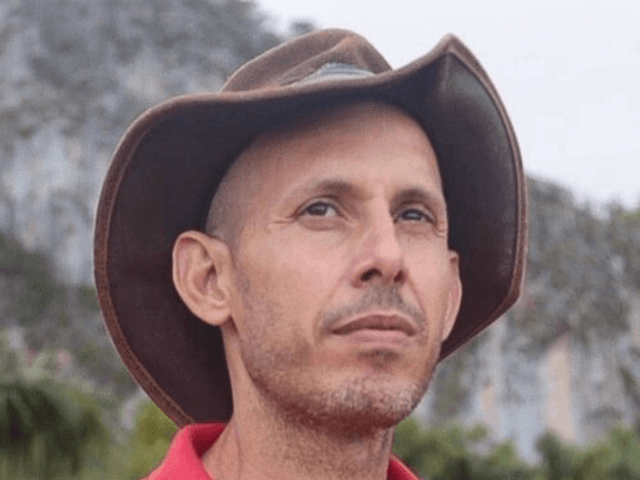Cuban ecologist and human rights activist Dr. Ariel Ruiz Urquiola began a hunger strike Monday before the U.N. High Commissioner for Human Rights offices in Geneva, asserting that the Castro regime deliberately infected him with HIV and consistently persecuted him and his family.
Police have repeatedly detained Ruiz Urquiola, initially for his environmental research showing the ecological destruction the Castro regime has caused on the tropical island, later for his participation in LGBT rights advocacy. The Castro regime is one of the world’s few remaining incumbent governments to have placed LGBT people in labor camps for their sexual identity.
Ruiz Urquiola is currently in Geneva, where he approached the U.N. Office of the High Commissioner for Human Rights (OHCHR) to deliver a letter addressed to the high commission, socialist former president of Chile Michelle Bachelet. In the letter, Ruiz Urquiola accused the Castro regime of deliberately introducing the HIV into his system during one of his arrests and asserted that he sought only to make the world aware of the regime’s crimes.
Ruiz Urquiola announced a hunger strike with the purpose of “having my right to be heard without intermediaries in a plenary meeting be respected, as a victim of human rights crimes and torture on the part of the Cuban dictatorship.” Cuba is a member of the U.N. Human Rights Council.
“I am not here to file charges against the government, just to make our cases in presentations before citizens who still believe in the U.N.,” Ruiz Urquiola’s letter asserted.
The letter listed as specific human rights crimes against him Ruiz Urquiola’s arrest in 2018 for attempting to engage in a private scientific study on the Cuban environment, an arrest during which, he wrote, “The Cuban dictatorship infected me with a strain of HIV.” He also accused the government of denying cancer medication to his sister, Omara Ruiz Urquiola, who suffers from breast cancer. He has claimed to possess medical documents proving that he is currently an HIV carrier as a result of the Castro regime infecting him, not through any actions of his own or other exposure outside of political prison.
Ruiz Urquiola attracted government attention as a graduate student in biology for seeking to study how communist policies had adversely affected life on the island, resulting in his expulsion from the University of Havana in 2016. At the time, Ruiz Urquiola had established an ecological site in western Pinar del Rio province to use for studying the environmental effects of Castro regime policies, despite being ordered to cease his research. According to the Victims of Communism Memorial Fund, which tracks human rights abuses by communist states, Urquiola’s initial offending research focused on the destruction of native sea turtle communities by Communist Party fishing regulations.
On his Pinar del Rio plot “he began to produce fruit and coffee and to reforest the land with native tree species, which also serves the purpose of restoring the native animal species.” He also began to observe the widespread destruction of native species such as the jutía, a rodent that Cubans began killing off for consumption when the Revolution triggered chronic food shortages.
Cuban secret police reportedly poisoned some of the animals on the site as well as water sources at the farm and, failing to intimate him, finally arrested him two years later for “disrespect” (desacato), a uniquely communist catch-all crime for political dissidents. A judge sentenced him to a year in prison, the maximum punishment allowed by law.
Ruiz Urquiola went on hunger strike in prison, prompting international attention, including from the U.S. State Department.
“Cuban government officials have harassed Dr. Ruiz Urquiola for years for speaking out on environmental issues,” remarks from the State Department issued in 2018 read. “We are deeply troubled by reports that he is currently on a hunger strike and in a critical medical condition.”
The pressure resulted in an early release. By the time he was out, he was HIV positive, which he says was the product of being injected deliberately with the virus by prison medics.
Ruiz Urquiola continued his activism following his release, most notably participating in one of Cuba’s largest LGBT parades in history in May 2019. While the Castro regime has traditionally imprisoned and executed suspected LGBT people, in the modern era it has instead established a government office for LGBT and sexual issues generally, run by the daughter of dictator Raúl Castro, Mariela. The May 2019 parade was a rejection of a state-organized, communist LGBT parade meant as a display of individualism challenging the regime’s attempted control of individual sexual identity. Ruiz Urquiola was arrested among a large number of participants in Havana.

COMMENTS
Please let us know if you're having issues with commenting.